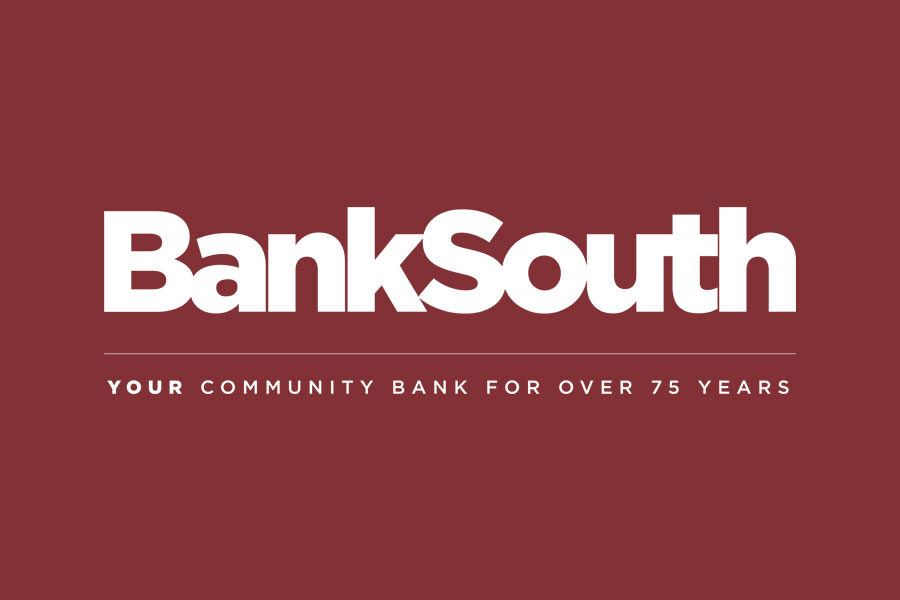![]() FDIC-Insured – Backed by the full faith and credit of the U.S. Government
FDIC-Insured – Backed by the full faith and credit of the U.S. Government
It’s official! State Bank of Cochran Joins the BankSouth Family! Learn More
New to BankSouth? Start Here
![]() FDIC-Insured – Backed by the full faith and credit of the U.S. Government
FDIC-Insured – Backed by the full faith and credit of the U.S. Government
At BankSouth, we value the trust you place in us to safeguard your money and work every day to ensure you have easy and secure access whenever you need it.
BankSouth has been helping business owners launch and grow their businesses in the community for generations. Whether you’re opening a new location or expanding your existing one, we’re ready to help.
BankSouth offers immediate and easy access to your mobile and online banking. You can also apply for and review your ReadyLoan mortgage application.
Every financial situation is unique. Explore our many resources available to you to make wise decisions when it comes to managing your money.
For over ten years, BankSouth has helped thousands of families finance their homes. We know how daunting this may be, but we take the worry and hassle out of the process.

For Cybersecurity Awareness Month, it’s always a good idea to stay aware of the best ways to keep yourself and your personal information protected from online scammers. According to the Federal Trade Commission (FTC), they received 2.8 million fraud reports from consumers during the year 2021. That is up from 2.2 million in 2020. As a result of the 2021 fraud reports, consumers lost more than $5.8 billion – that’s a 70 percent increase from 2020.
So, if you want to avoid becoming a statistic for the rest of 2022, the time is now to educate yourself on the importance of cybersecurity and why you should be taking it seriously.
Many Americans don’t know it, but according to United States Cybersecurity Magazine, cyber threats date all the way back to the 1970’s before many people even knew what a personal computer was.
The first threat was called a computer worm that hopped from computer to computer – very original for the time – and when a computer was infected, the screen would state “I’m the creeper: catch me if you can.” The good news is the computer worm was not malicious and caused little to no damage to infected computers.
The next substantial attack came in 1988. It was another computer worm that was the first Denial-of-Service (DoS) attack. The purpose of it was to bring light to many security flaws, including weak passwords. Reports from the FBI claim the monetary damages ranged from $100,000 to millions.
In response to increasingly frequent and pervasive cyber attacks, the federal government created the Department of Homeland Security in 2002; within that agency, it established a dedicated division for cybersecurity.
To put it simply, cybersecurity is the protection of your personal information so it doesn’t get digitally harmed or stolen. Although many financial institutions, businesses, and health organizations go to great lengths to protect their customer’s sensitive information, there are several tools available for consumers to proactively keep their information safe. We’re not talking about only your financial information – this applies to your financial accounts, health records, address where you reside, phone numbers, email addresses, and more.
Without stringent cybersecurity — both from the businesses you trust, and through personal utilization of the available cybersecurity tools — your personal information could possibly get into the wrong hands.
There are some very simple methods to protect yourself and your personal information from being subject to a cyber scam. Here are a few “Don’ts” to keep cyber scammers at bay:
Keep your personal information personal. This goes for your finances, health information, family information, as well as your current and former addresses, and most definitely your social security number. Once a scammer has a hold of your social security number, there’s not much stopping them until it may be too late. It’s a good practice not to trust someone you don’t know because they may not be who they say they are.
Many scam artists will make you think you need to act on something right now. This is a scare tactic they use to make you think something bad is going to happen, or an opportunity is going to go away. If the opportunity they are presenting you with sounds too good to be true, it probably is.
If a person or company you’re unfamiliar with claims you owe them money, chances are high that it is a scam to get money from you. It’s best to do research on that company or individual before deciding whether it’s a scam. If it’s a scam, it’s likely to be listed on the internet as such. To search for scams, the Better Business Bureau has a Scam Tracker tool on their website that is free to use. Another option is to simply search on Google, Yahoo!, or Bing. Again, don’t trust that the person or organization is who they say they are.
When you log in to websites that contain your debit card number, credit card number, or any other type of personal information, it’s a good idea to completely log out of the website before you exit. Often, just closing the browser or mobile app you’re using will keep you logged in. It’s a healthy practice to completely log out of websites when you are done using them to keep your information private.
It’s in your best interest to ask lots of questions. Talk to friends, family, or any of the expert bankers here at BankSouth. We are happy to help you determine if a call, text, email, or piece of mail you received could be a scam.
BankSouth customers have reported many scams to us during this year. Though these may seem like the norm these days, there is a new one or two that we didn’t know of until our customers reported it to us.
An individual may call you claiming to be from a reputable company that many consumers know and trust. They may ask you to go open and click on an email. Once you click on the email it may unleash a virus or malware on your computer or mobile device. Do not follow these instructions. Hang up and call the organization’s main customer service line if you think this could be a scam. If an email looks like it could be spam, don’t open it. If you open it and the from address looks like it does not belong to the supposed sender, do not click it. Delete the email immediately. Ex: If “Amazon” is emailing you, but the from address is [email protected], that email did not come from Amazon.
Online retailers have been calling BankSouth customers to ask them to verify or update their payment information. Do not oblige the caller. Any online retailer, including Amazon, Netflix, or DoorDash, already has your payment information and will not be calling to verify it with you.
Individuals have been actively calling people to alert them that there is a critical issue on their personal computers. After convincing the target – potentially you – they will ask for remote access to take over your computer. Upon getting access, they unleash a virus or malware on your computer. No reputable computer manufacturer will contact you to let you know that you have a virus or problem with your machine.
When someone calls threatening action, such as turning off your power or phone unless you pay them money over the phone, hang up and call the actual company that is claiming you owe them money.
Financial profit scams are still around, along with the classic fake check scam and pyramid schemes. Stick with the traditional saying, “If it seems too good to be true…it probably is.”
Reporting a scammer is relatively easy and doesn’t take much time or effort on your part. If you were targeted by someone claiming to be with a reputable company, you can often contact that company and report the scam.
If you have paid a scammer with your BankSouth debit card, we may be able to stop the transaction. Contact our Customer Care team immediately at (706) 453-2265 to assist you.
To report fraud to the Federal Trade Commission, you can go to reportfraud.ftc.gov. The FTC uses the information it gathers from consumers that report fraud to help protect other consumers like yourself from being targeted by the same scammers.
Watch this short video from the Federal Trade Commission to learn how reporting fraud helps stop scammers.
Not following us on social? Let’s connect on Instagram, Facebook, or LinkedIn and keep the conversation going.
View our latest news and get the latest industry updates on our blog.



